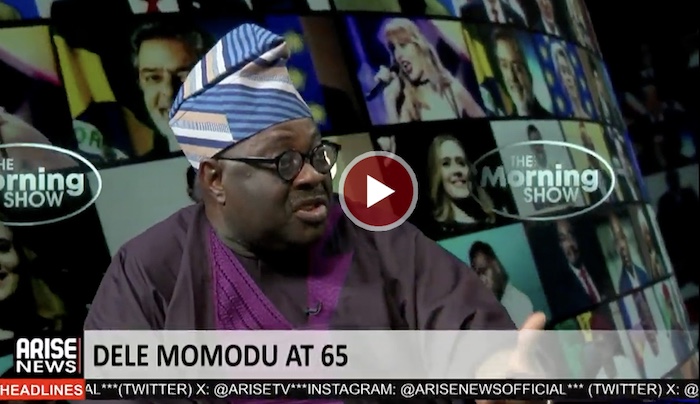
BREAKING: Dele Momodu: Okowa’s Defection to APC Was an Opportunistic Move, Not for The People
In a sharp critique of Nigeria’s political landscape, Peoples’ Democratic Party (PDP) chieftain Dele Momodu has condemned the defection of former Delta State Governor Ifeanyi Okowa to the All Progressives Congress (APC), describing it as the latest example of the country’s descent into a politics devoid of principle and ideology.
Momodu in an interview with ARISE News on Wednesday, said Okowa’s move was not rooted in public service but in sheer political opportunism.
“It is unfortunate that Nigerian politics has become an optical illusion. Gone are the days when we had politics of principles and ideology,” Momodu remarked. “Yesterday, I watched as former Governor Okowa was being interviewed, and he was struggling to defend the political charlatanry. Anyone who knows me knows that I am a democrat who believes in freedom of speech and movement. But when people say PDP is not doing well, what else does Okowa want? He has been secretary to government, governor for eight years, and even a senator. The only way to go was up, and yet, he was given an opportunity to be a running mate to Atiku Abubakar. What did he deliver? That is why I said he was struggling. Going to APC was an opportunistic move. Let us call a spade a spade.”
Momodu’s critique extended beyond Okowa’s defection to a broader reflection on the state of Nigerian politics. He highlighted the desperation that has come to define modern political maneuvering, particularly within the People’s Democratic Party (PDP). He challenged claims made by Okowa regarding the potential defection of Atiku Abubakar to the APC, dismissing them as unfounded.
“Atiku that I know is not a desperate politician. In fact, his description is that of a consummate democrat,” Momodu asserted. “I met him about three or four weeks ago in Abuja, and he said that politics for him is a game that should be played in a clean manner. You win, fine. You don’t win; you go back to the drawing board. That is why you will not go to Atiku’s house and find thugs in his house. The politics we play today is despicable; it is a politics of desperation. To say Atiku is going to APC, is impossible, I can guarantee you.”
Momodu also weighed in on the ongoing leadership challenges within the PDP, particularly the position of acting National Chairman, Ambassador Umar Damagum. Damagum had stated that the party would go to court to reclaim its mandate, but Momodu, a self-identified “part-time politician,” was less than impressed with the approach.
“The beauty of people like me is that I am a part-time politician. I have my job; I am a reporter and have never lived on politics. So, I can address issues clearly and dispassionately,” Momodu said. “Ambassador Damagum, if he and some of his members were truly patriotic about Nigeria, they would have done the right thing by sacking Wike. Anybody can sack Wike. He is sackable.”
Momodu further criticised Okowa’s sudden shift to APC, pointing out that while he had every right to move, the motivations behind his departure remained unclear.
“If Okowa left PDP to join the coalition, nobody would complain. But he never told us what they saw in APC that suddenly became so attractive, so irresistible, that they had to move,” he remarked. “I am tired of people saying it is for the people. Every politician is living for himself, both primarily and substantially. The people get only the crumbs.”
As the political season intensifies, Momodu also noted that the only way to effectively challenge President Bola Tinubu would be through a northern candidate. “PDP has been fair to the south. Tinubu can only be countered this time by a Northerner. Any Southerner telling you they want to contest against Tinubu is wasting their time,” he concluded.



